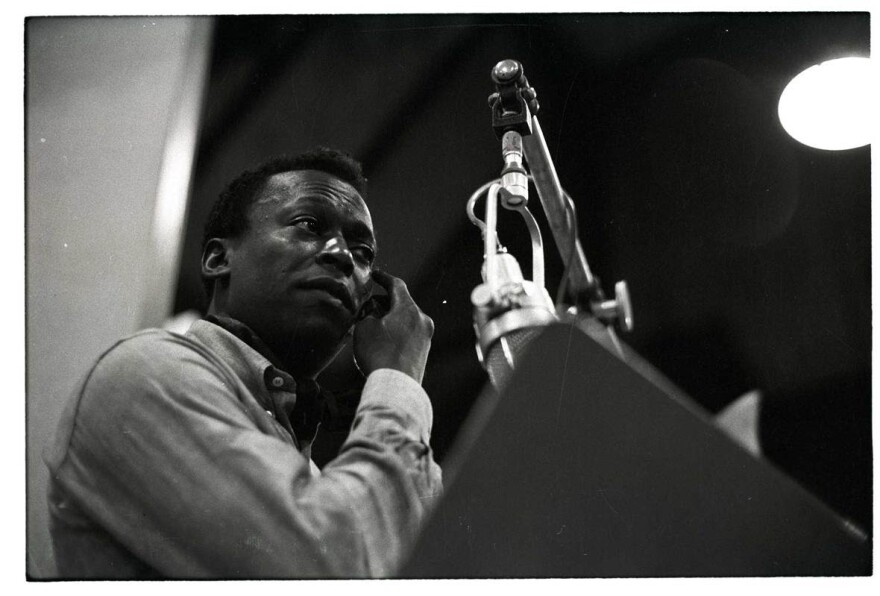Miles Davis led such a prismatic and changeable career that any attempt at summation is destined to feel incomplete.
But the 2019 documentary Miles Davis: Birth of the Cool does an impressive job of it, portraying the trumpeter in his myriad phases and moods, and in an unvarnished yet sympathetic light.
After premiering at last year’s Sundance Film Festival, it screened in theaters across North America and around the globe, earning a Grammy nomination along the way. For director Stanley Nelson and producer Nicole London, response to the film validated their obsessive immersion in a mountain of archival materials, countless hours of interview footage, and of course the music itself, which can still seem fathomless.
Last Friday, Columbia/Legacy released the film’s soundtrack, which not only includes landmark selections from the Miles Davis catalog but also commentary tracks by an array of sharp interview subjects: musical associates like Jimmy Cobb; business associates like George Wein; astute critics like Greg Tate. (There’s also a new track called “https://youtu.be/4dWZFta0Wl0" target="_blank">Hail to the New Chief,” produced by Vince Wilburn, Jr. and Lenny White.)
This week, Miles Davis: Birth of the Cool sees widespread release under the “American Masters” banner, in a U.S. broadcast premiere. To watch, tune in to your local PBS station on Tuesday at 9 p.m. ET, or stream via the PBS Video app or pbs.org/milesdavis.
So for Take Five this week, we asked WBGO announcers for a selection of favorite tracks from across Miles’ sprawling discography. These results — handpicked by the hosts of Midday Jazz, Afternoon Jazz, Saturday Afternoon Jazz, Latin Jazz Cruise and Jazz After Hours — paint as varied a portrait as Nelson’s film.
“New Rhumba” (From Miles Ahead, 1957)
Miles Davis always had a special affinity for the work of pianist Ahmad Jamal. One of the earliest examples of this is his recording of “New Rhumba,” with Gil Evans at the helm of a 19-piece orchestra for the 1957 album Miles Ahead. Having originally worked together years before on the groundbreaking sessions that would become Birth of the Cool, Miles and Gil had lost none of their musical rapport, with brass and woodwind charts perfectly accompanying the leader’s ruminations on flugelhorn. Probably the hottest of the pieces on the album, Jamal’s “New Rhumba” in their hands still sounds very cool. — Brian Delp
“Concerto de Aranjuez: Adagio” (From Sketches of Spain, 1960)
Unlike Dizzy Gillespie, Miles Davis oddly never embraced the Afro-Cuban/Latin rhythms that were ubiquitous during the height of New York’s mambo era. In fact, he had a legendary fistfight over it with percussionist Armando Peraza. So thank the late Frances Taylor — Miles’ first wife, and a breakout star of The Birth of the Cool — for bringing him to a performance by Spanish dancer Roberto Iglesias, which inspired him to record this masterpiece. It’s easy to see why the deep soul of flamenco spoke to Miles’ sense of melancholy, introspection, restraint and cool. Gil Evans’ masterful arranging provides a beautiful framework not only for Miles, but the Iberian culture that inspired him. — Bobby Sanabria
“Right Off” (From Jack Johnson, 1971)
“I could play with anybody, in any style — if you’re playing one way, I can play that style —because I had learned all the trumpet styles by then.” So said Miles Davis in his autobiography, recalling the 1960s. On “Right Off” — a mostly one-chord jam from his 1970 album A Tribute to Jack Johnson — we hear Miles unleash what I consider his greatest recorded solo. Backed by the power trio of John McLaughlin on guitar, Michael Henderson on bass and Billy Cobham on drums, he strikes a perfect balance of sound, speed, silence and pure power that both illustrates his lineage (Louis Armstrong, Clark Terry, Dizzy Gillespie) and points to where it would go (Freddie Hubbard, Woody Shaw, Ambrose Akinmusire). — Greg Bryant
“Time After Time” (From You’re Under Arrest, 1985)
There’s a Miles Davis song that I can go to for virtually every pivotal point in my life. For my 13th birthday, I received several cassette copies of Cyndi Lauper’s “She’s So Unusual,” featuring the Grammy-nominated song “Time After Time.” Miles reimagined the pop hit on his 1985 album You’re Under Arrest. The clarion call of his crisp three-note opener instantly redefines the song. His elastic sense of time, trance-inducing tone and playful coolness take it to an entirely new dimension. In simplicity he creates a staggeringly beautiful canvas. — Monifa Brown
“Tutu” (From Live Around the World, 1996)
“Tutu” is the perfect intersection or funk, R&B, jazz and soul. Composed by bassist Marcus Miller (who was producing artists like Luther Vandross, David Sanborn and Chaka Khan at the time), the tune has a special synergy on this version, recorded at the 1990 Montreux Jazz Festival and featured on the album Live Around the World. With Kenny Garrett on alto saxophone, Foley and Richard Patterson on bass, Kei Akagi on keyboards (with Miles also joining him on keys between trumpet riffs), Erin Davis on electronic percussion, and Ricky Wellman on drums, this configuration bred a funk that still leaves an indelible bop in your spirit. — Keanna Faircloth







